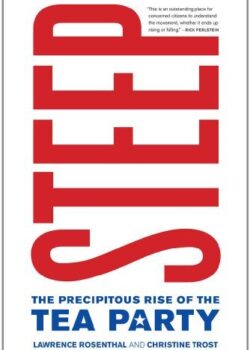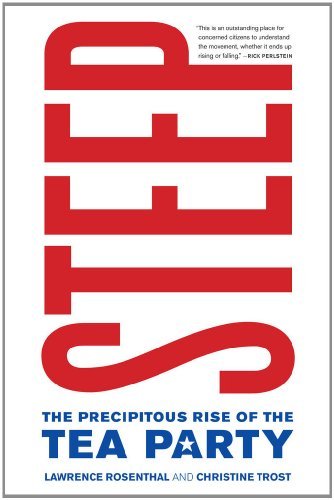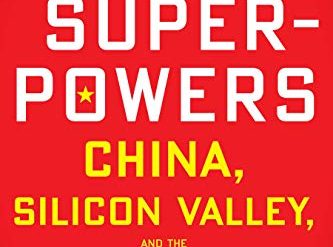
If you know nothing about the Tea Party other than what you’ve picked up from the daily news and a magazine article here and there, chances are excellent that you’ll learn a great deal from reading Steep.
Estimated reading time: 5 minutes
Here are just a few of the insights I gained from this superb collection of scholarly articles that examine the Tea Party from the front, the back, upside down, and sideways.
There is, really, no such thing as “The Tea Party.” The term encompasses thousands of organizations at the national, statewide, and local levels that at any given time may well be found squabbling with one another about ideology, tactics, or just plain personality differences. I knew about the proliferation of groups but not about the diversity of views among them.
The Tea Party phenomenon first surfaced less than a month after Barack Obama’s inauguration as President in 2009 — yes, less than four years ago — as what one scholar calls a “test marketing” campaign backed by money from the Koch Brothers and mainstream Republican operatives such as former Congressman Dick Armey, which we all knew very well at the time. However, the movement spawned by this intentional investment in destabilizing the fledgling Obama Administration grew so quickly and with such spontaneity that its original backers soon lost control. Whatever else it might be, the Tea Party is a grassroots phenomenon.
Steep: The Precipitous Rise of the Tea Party by Lawrence Rosenthal and Christine Trost (2012) 297 pages ★★★★★
Unlike the Christian Right before it, the Tea Party brought few new voters into the Republican column. As several of the authors in Steep make clear from their studies of a wide variety of poll results, the Tea Party is populated largely by Right-Wing Republicans who usually vote, anyway. (They also tend to be white males at or nearing retirement age.) The Tea Party brought passion to the Republican grassroots base, providing the necessary motivation to draw more foot-soldiers to the conservative cause.
Resuscitating the old John Birch Society
The old John Birch Society, which we all thought had gone the way of the Cult of Isis in the 1960s after William F. Buckley, Jr. consigned it to purgatory, somehow managed to resuscitate itself and become engaged in Tea Party activities. So did former leaders of the White Citizens Councils, the militia movement, and other assorted cranks, kooks, and eccentrics and the delusions they brought with them. Since nearly one-half (44%) of Tea Party adherents professed to believe that Barack Obama is a Muslim and was not born in the United States, using the term delusional is not out of line.
The most intriguing chapter in Steep is University of Michigan political science and women’s studies professor Lisa Disch’s, in which she “advances a counterintuitive argument: The Tea Party movement is sparked, in part, by the threat its supporters perceive to their share in two key programs of the liberal welfare state [i.e., Social Security and Medicare]. Tea Party politics is conservative, but its supporters’ material commitments and even aspects of their rhetoric place them in a liberal genealogy.”
Disch argues that, during its first two decades, Social Security was explicitly racialized — farmworkers and domestic workers were specifically excluded from benefits (and guess who they meant by that!) — and that for decades afterward Social Security was seen as largely a benefit to white people, even after the coverage was broadened. “This makes Tea Party mobilization a ‘white citizenship’ movement: action in defense of material benefits that confer ‘racial standing’ in a polity that purports to deny precisely that — special standing based on race . . . [T]he Tea Party movement belongs to liberal America even as Tea Party rhetoric denounces liberalism and liberals denounce Tea Partiers.”
My own conclusion
Since I’m not bound by the strictures of academic “objectivity” (whatever that is), I can sum up all this information with my own conclusion: The Tea Party is the latest and the most extreme expression of the Right-Wing Republican movement that has been growing since its inception in the 1940s and 1950s in McCarthyite anti-Communism, the John Birch Society, and Southern opposition to civil rights, and in the backlash to the New Left, feminism, and the anti-war movement. Though the Tea Party is heterogeneous in many ways, and its focus nationally has been on advancing the Republican agenda of small government and rolling back taxes, the overwhelming majority of its adherents also embrace the social politics of the Christian Right (anti-gay, anti-abortion, anti-women’s rights) and the suppressed but all too real racial resentment that has been the centerpiece of the Republican Party’s Southern Strategy since the days of Richard Nixon.
As I write this, however, I wonder whether anyone but historians and political scientists will care much about the Tea Party five years, or even a year, from now. It remains to be seen what impact the Republican losses of 2012 will have on the spirit and the cohesion of the Tea Party.
Steep is a product of the Berkeley Center for Right-Wing Studies at the University of California’s flagship campus, edited by Lawrence Rosenthal and Christine Trost, the Center’s director and associate director, respectively. More power to them!
For related reading
This is one of the Good books about billionaires.
For an account of the historical origins of the Right-Wing activism in the Tea Party, see Birchers: How the John Birch Society Radicalized the American Rightby Matthew Dallek (The root(s of today’s Right-Wing extremism).
I’ve also reviewed Lawrence Rosenthal’s later book, Empire of Resentment: Populism’s Toxic Embrace of Nationalism by Lawrence Rosenthal (A scholar of Right-Wing politics dissects the Trump coalition). And this is one of the many Good books by Berkeley authors.
Like to read books about politics and current affairs? Check out Top 10 nonfiction books about politics.
If you enjoy reading nonfiction in general, you might also enjoy:
- Science explained in 10 excellent popular books
- 10 great biographies
- Top 10 nonfiction books about politics
And you can always find my most popular reviews, and the most recent ones, on the Home Page.




























For political activists, and just followers of American politics. this makes a lot clear.